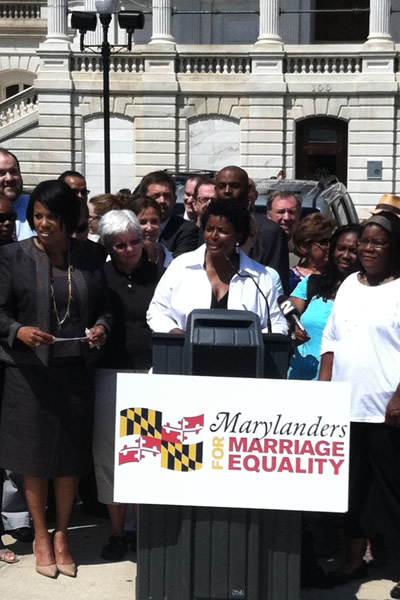Local
New effort to win marriage underway in Md.
‘We are not considering civil unions’


Del. Mary Washington (center), a lesbian member of the Maryland House of Delegates, announced plans for a new marriage bill at a news conference Tuesday. At left is Baltimore Mayor Stephanie Rawlings-Blake. (Washington Blade photo)
BALTIMORE — A diverse coalition of organizations announced plans Tuesday to push for a same-sex marriage bill in Maryland during the 2012 legislative session, which begins in January.
Led by Progressive Maryland, the coalition is dubbed Marylanders for Marriage Equality and includes Equality Maryland, the Human Rights Campaign, ACLU, Service Employees International Union 1199, Maryland Catholics for Equality and a number of other religious organizations.
Coalition members gathered at a sweltering morning news conference in front of Baltimore’s City Hall to announce their plans, just weeks after New York’s legislature approved a marriage equality measure.
“I believe in equality for all Baltimoreans,” said Mayor Stephanie Rawlings-Blake. “Baltimore will continue to stand with you in Annapolis.”
Sen. Rich Madaleno (D-Mont. Co.), when asked by the Washington Blade whether the coalition would consider a civil unions bill in lieu of marriage in the event of a referendum threat, said unequivocally that civil unions are an unacceptable compromise.
“It is marriage and only marriage — we are not considering a civil unions bill,” said Madaleno, the only openly gay member of the state Senate. “We will win a referendum if it gets that far.”
Gov. Martin O’Malley did not attend the news conference, but has said since 2007 that he would sign a marriage equality bill if the legislature can pass it. Del. Maggie McIntosh, a lesbian and the most senior member of the LGBT Caucus in the House of Delegates, said the coalition is in talks with O’Malley about taking a more visible and public role in advocating for the bill. O’Malley was criticized by some marriage rights supporters earlier this year for his perceived lack of visibility on the issue, which comes in stark contrast to New York Gov. Andrew Cuomo, who is widely credited with championing the issue in the Empire State.
McIntosh said marriage equality supporters have asked O’Malley to include the bill in the administration’s 2012 legislative package and that an answer on that request could come within weeks.
“The governor and the delegates have had discussions about this recently,” O’Malley spokesperson Raquel Guillory told the Blade after the news conference. “He is supportive of the new push and we are reaching out to a broad coalition of folks and discussing what steps we take next.”
Guillory didn’t say whether O’Malley would include the marriage bill in his administrative package.
“The governor was very clear last year that he would sign a marriage bill if it crossed his desk and that position has not changed,” she said. “He remains supportive.”
Asked why O’Malley didn’t attend today’s news conference, Guillory said, “This was an event organized by the delegates and [Rich] Madaleno — this was their event, it wasn’t the governor’s announcement.”
She added that the difference between the successful New York effort and the very visible role Cuomo played in it and O’Malley’s approach to the issue is merely a matter of style.
“You’re focusing on one issue,” she said, “you need to look at the personalities of the individuals. [Cuomo] is not much more out there [on marriage], he’s more vocal about everything, it’s a matter of style.”
She added that O’Malley “did a lot behind the scenes to work this bill,” and that taking Cuomo’s approach “doesn’t ensure passage.”
A marriage equality bill failed in the House of Delegates in March after the Senate approved it. Multiple factors were cited for its failure, including opposition from conservative black pastors in Prince George’s County and a vigorous and well-funded campaign by the anti-gay National Organization for Marriage to derail the bill.
But supporters noted that they had little time to plan last year, because the bill was bottled up in committee until a sudden reshuffling of committee assignments in December resulted in its Senate passage.
“I’m incredibly optimistic this time,” said lesbian Del. Heather Mizeur (D-Mont. Co.). “Last year, we were caught off guard; this year we have more time to plan.”
Responding to speculation that the bill could be introduced at a special October legislative session on redistricting, Mizeur said that the bill would most likely be considered in January.
Guillory said the focus of the October special session would be on redistricting. “Other options could be put on the table, but our focus is to take care of the redistricting issue,” she said.
Del. Peter Murphy (D-Charles Co.), who came out in an interview with the Blade earlier this year, echoed Mizeur’s confidence.
“I’m very optimistic,” Murphy said, “there is a tremendous effort and organization behind this and I’m confident the citizens of Maryland will support it.”
Rion Dennis, executive director of Progressive Maryland, vowed that Maryland would become the nation’s seventh state to enact marriage equality. His group is leading the marriage coalition. Sultan Shakir, an HRC employee who was loaned to Equality Maryland during the legislative session to work on marriage, is now working with Progressive Maryland.
Equality Maryland fired its executive director after the 2011 legislative session and its board chair later resigned. The group has been plagued by financial and staffing problems, but one board member said Tuesday that things are turning around.
“We have a six-month plan in place and are back on sound financial footing,” said Equality Maryland board member Mark Yost. “We look forward to working with the coalition to bring marriage to all Marylanders.”
Yost said Equality Maryland is planning to hire a new executive director but declined to say when that would occur.
In addition to politicians and activists, the Tuesday news conference highlighted the plight of two lesbian couples from Maryland. Kalima Young and Francine Housier joined Chris Megargee and Barbara McKeefery in addressing the media and taking about the importance of marriage equality to them and their families.
District of Columbia
D.C. Black Pride theme, performers announced at ‘Speakeasy’
Durand Bernarr to headline 2026 programming

The Center for Black Equity held its 2026 DC Black Pride Theme Reveal event at Union Stage on Monday. The evening, a “Speakeasy Happy Hour,” was hosted by Anthony Oakes and featured performances by Lolita Leopard and Keith Angelo. The Center for Black Equity organizes DC Black Pride.
Kenya Hutton, Center for Black Equity president and CEO, spoke following the performances by Leopard and Angelo. Hutton announced this year’s theme for DC Black Pride: “New Black Renaissance.”
Performers for 2026 DC Black Pride were announced to be Bang Garcon, Be Steadwell, Jay Columbus, Bennu Byrd, Rue Pratt and Akeem Woods.
Singer-songwriter Durand Bernarr was announced as the headliner for the 2026 festivities. Bernerr gave brief remarks through a video played on the screen at the stage.
DC Black Pride is scheduled for May 22-25. For more information on DC Black Pride, visit dcblackpride.org.
Virginia
Arlington LGBTQ bar Freddie’s celebrates 25th anniversary
Owner asks public to support D.C.-area gay bars

An overflowing crowd turned out Sunday night, March 1, for the 25th anniversary celebration of Freddie’s Beach Bar, the LGBTQ bar and restaurant located in the Crystal City section of Arlington, Va.
The celebration began as longtime patrons sitting at tables and at the bar ordered drinks, snacks, and full meals as several of Freddie’s well-known drag queens performed on a decorated stage.
Roland Watkins, an official with Equality NoVa, an LGBTQ advocacy organization based in the Northern Virginia areas of Arlington, Alexandria, and Fairfax County, next told the gathering about the history of Freddie’s Beach Bar and the role he said that owner Freddie Lutz has played in broadening the bar’s role into a community gathering place.
“Twenty-five years ago, opening a gay bar in Arlington was not a given,” Watkins told the crowd from the stage. “It took courage, convincing, and a deep belief that our community belongs openly, visibly, and proudly,” he said. “And that belief came from Freddie.”
Watkins and others familiar with Freddie’s noted that under Lutz’s leadership and support from his staff, Freddie’s provided support and a gathering place for LGBTQ organizations and a place where Virginia elected officials, and candidates running for public office, came to express their support for the LGBTQ community.
“Over the past 25 years, Freddie’s has become more than a bar,” Watkins said. “It has become a community maker.”
Lutz, who spoke next, said he was moved by the outpouring of support from long-time customers. “Thank you all so much for coming tonight and thank you all so much for your support over the past 25 years,” he said. “I can’t tell you how much that means to me and how much it’s kept me going.”
But Lutz then said Freddie’s, like many other D.C. area gay bars, continues to face economic hard times that he said began during the COVID pandemic. He noted that fewer customers are coming to Freddie’s in recent years, with a significant drop in patronage for his once lucrative weekend buffet brunches.
“So, I don’t want to be the daddy downer on my 25-year anniversary,” he said. “But this was actually the worst year we’ve ever had,” he added. “And I guess what I’m asking is please help us out. Not just me, but all the gay bars in the area.” He added, “I’m reaching out and I’m appealing to you not to forget the gay bars.”
Lutz received loud, prolonged applause, with many customers hugging him as he walked off the stage.

In an official statement released at the reveal event Capital Pride Alliance described its just announced 2026 Pride theme of “Exist, Resist, Have the Audacity” as a “bold declaration affirming the presence, resilience, and courage of LGBTQ+ people around the world.”
The statement adds, “Grounded in the undeniable truth that our existence is not up for debate, this year’s theme calls on the community to live loudly and proudly, stand firm against injustice and erasure, and embody the collective strength that has always defined the LGBTQ+ community.”
In a reference to the impact of the hostile political climate, the statement says, “In a time when LGBTQ+ rights and history continue to face challenges, especially in our Nation’s Capital, where policy and public discourse shape the future of our country, together, we must ensure that our voices are visible, heard, and unapologetically centered.”
The statement also quotes Capital Pride Alliance CEO and President Ryan Bos’s message at the Reveal event: “This year’s theme is both a declaration and a demand,” Bos said. “Exist, Resist, Have Audacity! reflects the resilience of our community and our responsibility to protect the progress we’ve made. As we look toward our nation’s 250th anniversary, we affirm that LGBTQ+ people have always been and always will be part of the United States’s history, and we will continue shaping its future with strength and resolve,” he concluded.
-

 India4 days ago
India4 days agoActivists push for better counting of transgender Indians in 2026 Census
-

 Advice4 days ago
Advice4 days agoDry January has isolated me from my friends
-

 District of Columbia4 days ago
District of Columbia4 days agoCapital Pride reveals 2026 theme
-

 National4 days ago
National4 days agoAfter layoffs at Advocate, parent company acquires ‘Them’ from Conde Nast


















